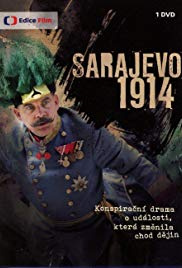
SARAJEVO
Austria/ Czech Republic, 2014, 97 minutes, Colour.
Florian Teichmeister, Malika Foroutan, Heino Ferch.
Directed by Kurt Mundl, Andreas Prochaska.
This is an Austrian film, filmed in the Czech Republic with a Czech cast, but a Bosnian Serb story, taking the audience back to a re-creation of those fatal days in August 1914 in the city of Sarajevo.
While the action takes place over a few days, there is a substantial re-creation of the city, vistas, costumes and decor. There is the visit of the Archduke Franz Ferdinand and his entourage, a bomb being thrown by anarchists, the Archduke deciding to go to hospital to visit victims, his carriage taking a wrong turn, more young anarchists firing on the carriage and the death of the Archduke and other victims.
At the centre is the investigator, a Jewish man – and, at times, subject to anti-Semitism – who cycles around the city, is appointed as official interrogator of the suspects, is asked to write reports, especially for the Austro- Hungarian authorities in Vienna. He goes about his work diligently, getting some information and confessions from some of the suspects, discovering that the Serbs, age 19, subversive. He has to fight for his integrity and uncovering of the truth.
There are some moments in the private life of the investigator, his love for a young woman, daughter of a financier, who is, in fact, Serb. This is held over him and he bargains for the escape of the young woman and her father from Sarajevo.
As the narrative continues, there is a suggestion of a conspiracy theory, that it was those who wanted war against Serbia who arranged the route, instigated the young men. The audience is shown some sinister characters, a doctor who is part of the plot, military men, the ambassador from Vienna, all determined to crush Serbia, to involve the Germans, to attack the Russians and the French – and for war in Europe. It would seem that they did not envisage such a vast war, The Great War, the war to end all wars, involving the whole world.
1. A recreation of August to 1914, Sarajevo, the assassination and the consequences? World War I?
2. Audience knowledge of the events and characters? The consequences for Europe, German and Austro- Hungarian aggression, against Serbia, drawing Russia and France into the war – and beyond?
3. The period, Sarajevo, views of the city, streets and river, car cavalcades, the official buildings, the interiors, homes and apartments? Cycling through the streets? The musical score?
4. The recreation of the assassination attempts, the young men, 19, scattered around the city, with the bombs, the guns, the first attempt with the bomb? The repeat, Franz Jozef driving down the wrong street, the confrontation with the assassin, his shots? The deaths?
5. Introduction to Leo Pfeffer, dressing, his tie, precision, riding his bike, his position in the government, his Jewish background and the derogatory references, the information, his being asked to investigate? The bomb thrower, his attempted suicide, the questioning? The news of the shootings? The rounding up of other young men? His interrogations, the threats, the information given, their being served?
6. Prejudice against the Serbs? The government? The railway from Berlin to Baghdad? Motivations for the killings? The Serbs seeing Franz Jozef as a tyrant? The speculation that he did not want war? The attitude of Sarajevo towards Austria, the Empire, the rulers? Attitudes towards Germany?
7. Leo, his personality, his interrogations, his suspicions, his relationship with Marija, her going to Paris with her father, the invitation to go, his wanting a family and children? The officials knowing about the relationship? Blaming him? Holding it over him? The encounter with Maria, sexual? Possibilities for him? Marija, her father, Serbs, their being blamed, blocking their bank accounts? Leo and the blackmail, getting the passports and tickets for them, the farewell?
8. The range of officials, their demands on Leo, his assistant, getting the documentation? Finding about the driver of the car? Going to his house, his imprisonment, his family? The visit in prison?
9. The emissary from Vienna, expectations, the document, allowing Leo 24 hours, the handing over of the document? The meetings and the war plans?
10. Fiedler, his hold over Leo, his personal interests in finance, the railway, making demands?
11. The presence of Herbert Sattler, friendship with Leo, surgeon, the discussions about the poisonings, his role with the military, playing billiards, sure attitude, wanting war with Serbia? The documents, his plan in the assassination, the others collaborating, wanting to provoke war?
12. Leo, crisis of conscience, discussions with the prisoners, the execution of the farmers who allegedly helped them, the threats, naming names or unwilling to name?
13. Leo, saving Maria and her father, wanting the truth, writing down the truth?
14. The final sequences, the footage from World War I, enveloping hold of Europe and beyond?